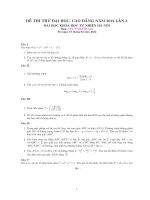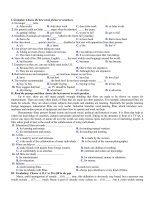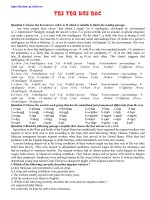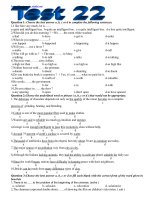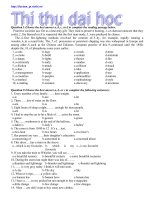Đề thi thử cao đẳng, đại học môn tiếng anh - Đề số 7 pot
Bạn đang xem bản rút gọn của tài liệu. Xem và tải ngay bản đầy đủ của tài liệu tại đây (110.58 KB, 5 trang )
I. Grammar: Choose the best word, phrase or sentences.
1. No longer _____ here.
A. John works B. John does work C. does John work D. so John works
2. His parents could not help _____ angry when he admitted _____ the exam.
A. getting/ failing B. got/ failed C. to get/ to fail D. get/ to fail
3. Hundreds of animals are reported _____ killed in the forest fire yesterday.
A. that to be B. to be C. to have been D. that to have been
4. Her idea about _____ special class for _____ disabled at first met with opposition from their parents.
A. a/a B. a/ these C. a/ the D. the/
5. I am always nervous when taking an exam.
A. Taking an exam always makes me nervous. B. I am taking a nervous exam.
C. The exam I am taking is nervous. D. It is a nervous exam that I am taking.
6. Since the end of the 20th century, English _____ the most widely used language around the world.
A. had become B. became C. becomes D. has become
7. Expensive as they are, cars are widely used in the US.
A. Because they are expensive B. Due to they are expensive
C. They are too expensive D. Although they are expensive
8. Both televisions and computers _____ an enormous impact on our lives.
A. have B. had had C. have has D. have had
9. The teacher recommended _____ the book but I do not have enough money _____ it.
A. buy/ to buy B. bought/ buying C. buying/ to buy D. to buy/ buy
10. They suggest that beer _____ on TV should be banned.
A. advertising B. advertised C. advertise D. to advertise
II. Read the passage and then choose the best answer to each question.
Up to now, there are still many people wrongly thinking that films are made to be shown on screen for
entertainment. There are many other kinds of films that are made for other purposes. For example, educational films are
made for schools. They are about certain subjects that pupils and students are learning. Especially for people learning
foreign languages, educational films are very useful. Industrial branches need training films which introduce new.
machines and modern pieces of equipment and show how to operate and work on them.
Documentary films present factual events and record social, political and historical events. It is films that help us
widen our knowledge of countries, cultures and people around the world. Sitting on the armchair in front of a TV set, a
viewer can enjoy the beauty of nature all over the world, see many historic spots and meet a lot of interesting people. A
film, either good or bad, is the result of the collaboration of many individuals.
11. Educational films are made
A. for learning and money. B. for training manual workers.
C. for entertainment and money. D. for teaching and learning.
12. A film
A. is made by actors and actresses. B. is made by the viewers.
C. is the result of the collaboration of many individuals. D. is the result of the cinema photographer.
13. Films can help us
A. make friends with people from foreign country. B. teach our children everything.
C. sit comfortably in an armchair. D. entertain and widen our knowledge.
14. All films are made
A. for entertainment. D. for entertainment, money or education
B. for education. C. for money. .
15. Industry
A. needs training films. B. needs love stories.
C. has no relation with films. D. always pays attention to every kind of films.
III. Vocabulary: Choose A, B, C or D to fill in the gap.
Music, artful arrangement of sounds (16) time. this definition is obviously very broad, but a narrower one
would exclude (17) much. Music is part of virtually every culture on (18) , but it varies widely among
cultures in style and structure. Definitions of music can (19) dramatically over a short time, as they have across
the world during the 20th (20) .
Can music exist without (21) ? Some philosophers argue that music should be defined as a kind of "mental
(22) " and that the physical aspects of sound are simply by-products of this image. If you (23) you can have
a musical experience by imagining the sound of a piece of music, then you think (24) can exist without sound. But
most musical experiences involve producing or (25) to physical characteristics of sound such as pitch and timbre
(quality comparable to texture or colour in sight).
Is the tape-recorded sound of a large metal-stamping machine music? Are 4 minutes (26) 33seconds of
silence music? Is the activity of reading a (27) of hundreds of seemingly unrelated objects, activities, and states of
mind music? Each of these " (28) ", as well as many other sounds (or non-sounds), has been copyrighted
(29) a musical composition, performed, and recorded in the 20th century. One of the legacies of 20th-century music
is to have blurred the definition of music as (30) before.
16. A. through B. over C. across D. along
17. A. very B. too C. enough D. so
18. A. Earth B. the sun C. stars D. the moon
19. A. vary B. change C. stay D. remain
20. A. century B. year C. month D. decade
21. A. sound B. accent C. noise D. voice
22. A. image B. picture C. drawing D. painting
23. A. say B. know C. think D. see
24. A. images B. people C. culture D. music
25. A. listening B. speaking C. writing D. reading
26. A. but B. and C. or D. so
27. A. book B. list C. title D. menu
28. A. words B. phrases C. works D. letters
29. A. as B. for example C. like D. such as
30. A. seldom B. ever C. not D. never
31. Tom was encouraged by my success. He decided not to quit his work.
A. Encouraged by my success, Tom decided not to quit his work.
B. To be encouraged by my success, Tom decided not to quit his work.
C. That he was Encouraged by my success, Tom decided not to quit his work.
D. Encouraging by my success, Tom decided not to quit his work.
32. The man asked me how old I was.
A. The man asked me if I knew his age. B. The man told me that he was old.
C. The man knew how old I was. D. "How old are you?" the man asked me.
33. If only I had not seen him.
A. He wishes he had come to see me. B. I have not seen him for ages.
C. I wish I had seen him. D. I wish I had not seen him.
34. She told me she had to be home by six o'clock.
A. She told me that she would be going home at six o'clock.
B. She told me she was at home at six o'clock.
C. She said it was necessary for her to get home before six o'clock.
D. She said that she usually reached her home before six o'clock.
35. They did not take my advice and they got the troubles.
A. Had they taken my advice, they would not have got the troubles.
B. Unless they had taken my advice, they would have got the troubles.
C. Had they taken my advice, they would not have got the troubles?
D. Unless they had taken my advice, they would not have got the troubles.
36. The family find it difficult to manage on the money they have.
A. The family managed to earn enough money.
B. It is difficult for the family to get by on the money they have.
C. The family could manage on the money they have.
D. It is difficult for them to earn money.
37. I do apologize for my forgetting your birthday.
A. I am really sorry I forgot your birthday. B. I did not forget your birthday.
C. I never apologize for my forgetting birthdays. D. I am not sorry at all because I remember your birthday.
38. I won't finish the report because it is too long.
A. The report is so long for me to finish. B. The report isn't long enough for me to finish.
C. The report is too long for me to finish. D. The report is so long that I can't finish.
39. Do they advertise cigarettes widely in your country?
A. Are cigarettes advertised widely in your country? B. Are they advertised cigarettes in your country?
C. Do cigarettes be advertised in your country? D. It is cigarettes advertising in your country?
40. Our coach gave us some news which seemed too good to be true.
A. The news she gave us was good, but of course it wasn't true.
B. We couldn't easily believed the news because it was very good.
C. It was excellent news, so we knew it must be true.
D. Our coach told us that true news is always good news.
51. (A) Because of his mother (B) has been (C) seriously ill, she (D) can't come to the party.
52. It was not (A) until 1937 (B) when the southernmost source of (C) the Nile River (D) was discovered.
53. It is said (A) that it is (B) such polluted air that we (C) can't breath, (D) isn't it?
54. The tongue is the (A) principal organ (B) of taste, and (C) is crucial for chewing, (D) swallowed, and speaking.
55. (A) Because of habitat (B) loss, there are (C) less Asian elephants than African (D) elephants.
56. He could remember (A) to drive (B) along the road (C) just before the accident happened, (D) but he couldn't
remember the accident itself.
57. I'd love (A) to have gone (B) to the party, (C) but it was (D) possible.
58. (A) The water wasn't (B) warm enough for these (C) young children (D) to swim.
59. "I can't come (A) in Friday." "That's (B) too bad - I've (C) already bought the tickets (D) so you'll still have to pay."
60. A traveller can (A) reach some of (B) the village along the Amazon (C) only by (D) riverboat.
VII. Choose the word with the different pronunciation of the underlined part.
61. A. about B. thousand C. around D. should
62. A. character B. action C. rapid D. decade
63. A. films B. trucks C. tips D. lifts
64. A. cause B. clause C. pause D. loose
65. A. rough B. laugh C. cough D. plough
66. A. writer B. edit C. script D. public
67. A. actually B. acute C. active D. actor
68. A. pursue B. studio C. minute D. purity
69. A. threat B. though C. theatre D. thought
70. A. culture B. picture C. purpose D. nature
71. Her natural _____ made this one of the most enjoyable concerts of the year.
A. musicality B. musical C. musician D. music
72. A _____ diet includes lots of green vegetables.
A. healthful B. health C. health D. healthily
73. They _____ believe their children should make choices for themselves.
A. strongly B. strength C. strengthen D. strong
74. Dr Fox is a well-known _____ professor.
A. learning B. learnt C. learn D. learned
75. _____ the fighting stopped, travel across country has been quite safe.
A. After which B. When C. Since D. Unless
76. You can leave the money with him; he's totally _____.
A. trusting B. trustful C. trustworthy D. trusty
77. _____ me if I'm wrong, but I think we arranged the meeting for the 12th of December.
A. Correctly B. Correction C. Correct D. Corrective
78. The blue curtains began to _____ after they had been hanging in the sun for two months.
A. dissolve B. melt C. die D. fade
79. The plane crashed into a bridge because it was flying too _____.
A. narrow B. low C. shallow D. deep
80. The _____ of the poetry competition will be known today.
A. decision B. effect C. choice D. result
Key de so 3
01. - - = - 21. ; - - - 41. - / - - 61. - - - ~
02. ; - - - 22. ; - - - 42. - - = - 62. - - - ~
03. - - = - 23. - - = - 43. - / - - 63. ; - - -
04. - - = - 24. - - - ~ 44. - - - ~ 64. - - - ~
05. ; - - - 25. ; - - - 45. - / - - 65. - - - ~
06. - - - ~ 26. - / - - 46. - - = - 66. ; - - -
07. - - - ~ 27. - / - - 47. ; - - - 67. ; - - -
08. ; - - - 28. - - = - 48. - / - - 68. - - = -
09. - - = - 29. ; - - - 49. - - - ~ 69. - / - -
10. ; - - - 30. - - - ~ 50. ; - - - 70. - - = -
11. - - - ~ 31. ; - - - 51. ; - - - 71. ; - - -
12. - - = - 32. - - - ~ 52. - / - - 72. ; - - -
13. - - - ~ 33. - - - ~ 53. - - = - 73. ; - - -
14. - - - ~ 34. - - = - 54. - - - ~ 74. - - - ~
15. ; - - - 35. ; - - - 55. - - = - 75. - - = -
16. - - = - 36. - / - - 56. ; - - - 76. - - = -
17. - / - - 37. ; - - - 57. - - - ~ 77. - - = -
18. ; - - - 38. - - = - 58. - - - ~ 78. - - - ~
19. - / - - 39. ; - - - 59. ; - - - 79. - / - -
20. ; - - - 40. - / - - 60. - / - - 80. - - - ~


